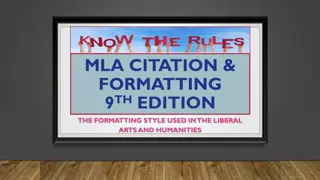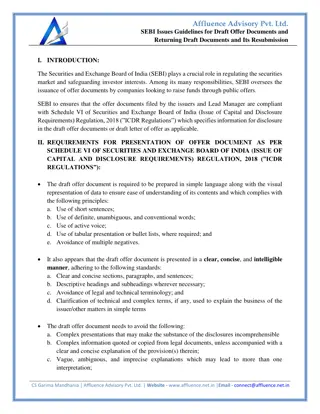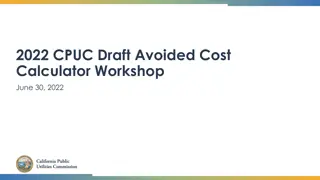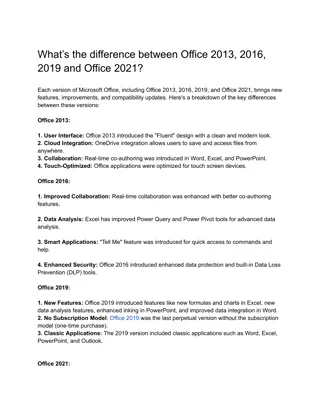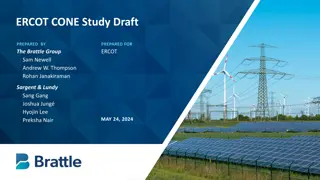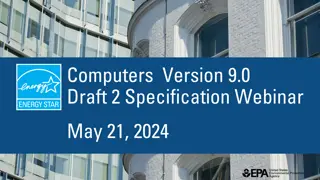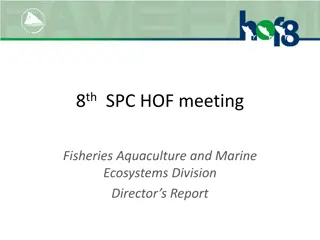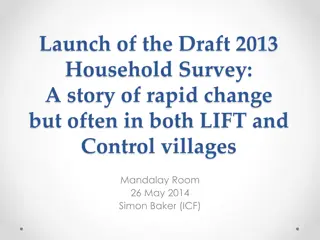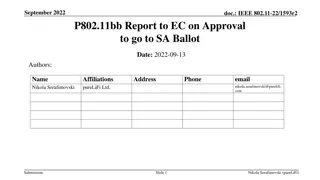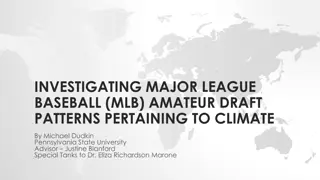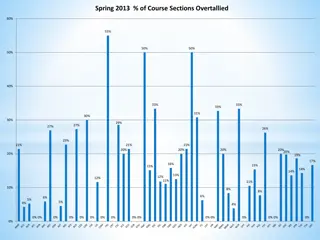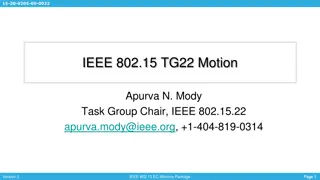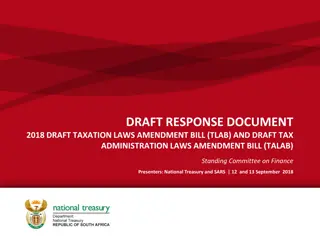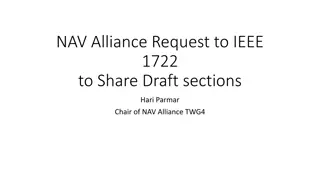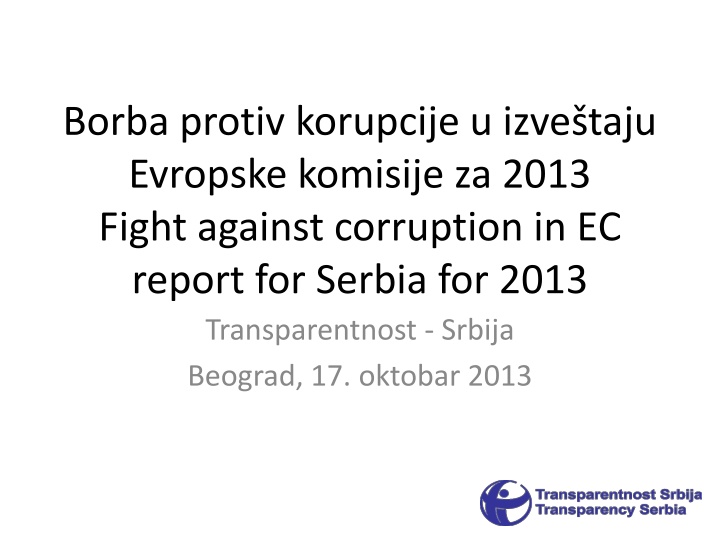
Transparent Governance Progress in Serbia 2013
In 2013, Serbia made strides in transparency and governance according to the European Commission report. The Parliament increased transparency with online publication of records and live debates. Government procedures were amended for better public consultation, but improvements are still needed in legislation oversight. The administration aimed for public reform but faced challenges in recruitment transparency. Overall, Serbia showed progress in combating corruption and enhancing governance practices.
Download Presentation

Please find below an Image/Link to download the presentation.
The content on the website is provided AS IS for your information and personal use only. It may not be sold, licensed, or shared on other websites without obtaining consent from the author. If you encounter any issues during the download, it is possible that the publisher has removed the file from their server.
You are allowed to download the files provided on this website for personal or commercial use, subject to the condition that they are used lawfully. All files are the property of their respective owners.
The content on the website is provided AS IS for your information and personal use only. It may not be sold, licensed, or shared on other websites without obtaining consent from the author.
E N D
Presentation Transcript
Borba protiv korupcije u izvetaju Evropske komisije za 2013 Fight against corruption in EC report for Serbia for 2013 Transparentnost - Srbija Beograd, 17. oktobar 2013
Parliament Parliament s work has been made more transparent by the new practices of publishing voting records and transcripts of plenary debates on the internet and live streaming of plenary debates and committees sessions. But urgent procedures with limited consultation and discussion time have continued to be used extensively to enact legislation. Independent Regulatory Bodies submitted annual reports for 2012 which were debated by the relevant committees before conclusions were examined by the plenary in July. But parliament has still given only limited consideration and follow-up to their findings and recommendations. Overall, the transparency of parliament s work and its consultation process has improved and there was progress in oversight of the executive. Urgent procedures are still often applied, unduly limiting time and debate for scrutiny of draft legislation. Parliament needs to develop a more proactive approach to the consideration and follow-up of recommendations of Independent Regulatory Bodies. Serbia has not yet enacted changes to the electoral framework as recommended by OSCE/ODIHR. Komentar: EK hvali pove anje javnosti rada Skup tine. Me utim, trebalo bi ista i da se jo uvek ne objavljuju amandmani. EK daje veliki zna aj razmatranju izve taja nezavisnih organa i re avanju problema na koje ukazuju. EK konstatuje napredak; me utim, u stvarnosti je nadzor Skup tine nad radom Vlade o igledno nedovoljan.
Government In March, the government amended its rules of procedure, significantly extending the holding of public consultations and making it compulsory to carry out impact assessments in consultation with the Office for the Regulatory Reform and Impact Analysis. The transparency of the legislative drafting process should be further enhanced and sufficient time given for effective consultation of all interested parties to ensure a more predictable legal environment. More attention also needs to be given to the implementation and monitoring of enacted legislation. The government needs to follow up the findings and recommendations of independent regulatory bodies actively and to keep a record of this follow up. Komentar: EK konstatuje bitno unapre enje Vladinog Poslovnika. Me utim, ove promene nisu dovele do bitnog unapre enja prakse javnih rasprava ne po tuje se ni minimum obaveza koje su propisane u aprilu 2013. EK daje preporuku za unapre enje javnosti zakonodavnog postupka, ali se ne govori detaljno o merama (npr. ure enje lobiranja). EK nagla ava bitnost pra enja efekata usvojenih propisa. EK tra i da Vlada radi po preporukama i nalazima nezavisnih organa. Me utim, nema konstatacije o tome da se one direktno kr e. Nema komentara u vezi sa organizacijom borbe protiv korupcije unutar Vlade i odsustvu nadzora nad javnim preduze ima.
Public administration The government undertook to develop a new public administration reform (PAR) strategy covering all key aspects of the horizontal PAR as well as an action plan for 2013-16. The PAR strategy is expected to be adopted until end of 2013. With regard to the legislative framework, a new Law on General Administrative Procedures and a Law on local government employees and salaries have yet to be adopted. A merit-based civil service system in central and local government needs to be put in place. Recruitment, particularly for managerial and middle-management positions, is an issue of serious concern, as a substantial proportion has been conducted through non-transparent procedures. Komentari: Daje se na zna aju strategiji reforme javne uprave i o ekuje dono enje novog ZUP-a i Zakona o slu benicima lokalne samouprave, kao bitnih stavki. Tra i se uspostavljanje meritornog sistema zapo ljavanja i napredovanja na svim nivoima. Kontatuje se da je u velikom delu imenovanje rukovodilaca srednjeg nivoa bilo izvr eno na netransparentan na in. Problem je u stvari ve i ono je izvr eno suprotno Zakonu o dr avnim slu benicima i uz direktni uticaj politi kih stranaka.
Public administration Recruitment of local employees is regulated by the Labour Law, as the Law on Civil Servants does not apply to local government employees. Administrative and management capacity at local level is weak and significant disparities between municipalities persist. The government has shown the will to rationalize the organisation of public administration and to streamline subordinate bodies and agencies. However, only partial actions have been initiated, and a clear and comprehensive organisational policy has yet to be determined. Komentar: Poseban problem, po oceni EK je zapo ljavanje u lokalnoj administraciji. Problem je jednako velik i u javnim slu bama i javnim preduze ima. Tvrdi se u izve taju EK da je Vlada pokazala volju da izvr i racionalizaciju i reorganizaciju javnog sektora, ali da su preduzete samo parcijalne akcije. Me utim, ne samo da racionalizacija jo uvek nije zapo eta, ve se i dalje barata sa proizvoljnim brojkama tzv. agencija , a broj zaposlenih u javnom sektoru se jo uvek utvr uje.
Independent Regulatory Bodies Serbia has taken new steps to address the logistical constraints affecting Independent Regulatory Bodies . The Commissioner for Information of Public Importance and Personal Data Protection remained active both within the government and with the media and civil society. The number of requests from citizens has increased. His office was allocated new premises in August which should allow expanding its administrative capacity, when they become functional as from October 2013. Serbia s State Audit Institution (SAI) has continued to build up capacity and now has approximately 190 staff, including around 150 auditors. The SAI has improved and widened its audit coverage to include local self-government and state-owned companies, but it remains under-resourced for full audit capacity. Performance audit work has not started yet. Komentar: EK i dalje koristi pogre an naziv nezavisna regulatorna tela za pojedine nezavisne dr avne organe koji nemaju regulatornu funkciju uop te ili je ona sporedna. EK ukazuje na aktivnosti Poverenika i DRI, kao i re avanje nekih od problema ovih institucija (prostor za rad). Posebno se ukazuje na zna aj revizije svrsishodnosti javnih rashoda koja je tek zapo eta. Pojedini bitni problemi nisu pomenuti: neizvr avanje Poverenikovih re enja, nedono enje izmena i dopuna Zakona o slobodnom pristupu informacijama i odsustvo sistemskih promena na osnovu revizorskih izve taja.
Anti-corruption policy Anti-corruption policy has been underpinned by a strong zero tolerance message from the government. Following broad stakeholder consultation, a new Strategy on the fight against corruption for the period 2013-2018 was adopted in July, together with a related action plan in August. The implementation of the Strategy and Action Plan will test Serbia s preparedness and willingness to proceed forward. It remains crucial that adequate resources are allocated. Investigations into corruption cases have been stepped up, especially in high-level cases, resulting in particular in criminal charges filed against two former ministers and the sentence in first instance of a former president of a commercial court to six and a half years of prison for abuse of office. The implementation of the legal framework and the efficiency of anti-corruption institutions need to be improved. Komentar: EK: Borba protiv korupcije podr ana kroz poruku nulte tolerancije koju je dala Vlada ; EK isti e dobre strane usvojene Strategije i Akcionog plana; EK pominje nekoliko slu ajeva zapo etih istraga sa optu enima koji su bili na visokim polo ajima; EK daje veliki zna aj primeni postoje eg pravnog okvira i efikasnosti rada institucija. ta je jo bitno: pitanje sprovo enja antikorpcijskih zakona od strane same Vlade, ozbiljni nedostaci Strategije i Akcionog plana, pitanje lanca komandovanja kod istraga zloupotreba i korupcije, stalnost struktura koje se bave tim istragama
Anti-Corruption Agency The Anti-Corruption Agency s operations continued, mostly in relation to the control of the financing of political parties. The Anti-Corruption Agency needs to make full use of its capacity, in particular for checks on the funding of electoral campaigns. In May, the Agency adopted its first report ever on the financing of electoral campaigns, for 2012. Annual financing was reported by two thirds of political groups. The Agency submitted 53 requests for misdemeanour procedures on the grounds of inappropriate use of funds, untimely submission of annual financial reports and no submission of electoral campaign financial reports. However, cases of illicit wealth will have to be addressed in line with the provisions of the action plan on the fight against corruption. Track records of asset declarations and checks on party funding need to be established. Detection and resolution of cases of conflict of interest remains at an early stage since although more files than ever were processed, very few charges were filed during the reporting period. Half of the public authorities obliged to draft Integrity Plans did not fulfill their obligations without any statutory sanctions being provided. Komentari: EK pridaje veliki zna aj temeljnoj kontroli izve taja o finansiranju kampanje, ispitivanju ta nosti imovinskih izve taja funkcionera, re avanja sukoba interesa i sprovo enju planova integriteta.
Judicial system The Serbian authorities have undertaken to implement the Constitutional Court s rulings of 2012 which overturned the non-reappointment of judges and prosecutors, leading to the reintegration of some 800 magistrates, representing one third of the total number. The parliament adopted a new National Judicial Reform Strategy for the period 2013-2018 in July Regarding the independence of the judiciary, the current constitutional and legislative framework still leaves room for undue political influence, in particular when it comes to appointments and dismissals, and needs to be amended. The impartiality of judges continues to be broadly ensured. In relation to accountability, one judge was sanctioned following disciplinary procedures in 2013. The procedure for lifting the functional immunity of judges, prosecutors and members of the Councils remain largely unused. The implementation of those control mechanisms needs to be stepped up, especially since allegations of corruption in the judiciary persist. Further reform of the court network will require a comprehensive analysis, notably in terms of cost, efficiency and access to justice. The quality of statistics needs to be improved. Komentar: EK konstatuje mogu nost politi kog uticaja i ukazuje na nedovoljnu primenu sistema odgovornosti , potrebu analize tro kova i unapre enja statistike.
Proactive approach to investigating corruption A proactive approach to investigating corruption needs to be maintained and result into final convictions, included in high profile cases. The judiciary needs to gradually build up a solid track record of convictions in this regard, particularly in cases of misuse of public funds. The law enforcement bodies need to gain expertise, in particular in financial investigations, and to become more proactive. Komentar: Jo sna nije nego ranijih godina ukazuje se na zna aj proaktivnog pristupa u ispitivanju korupcije, naro ito u slu ajevima zloupotrebe javnih sredstava, kao i zna aj finansijskih istraga. U vezi sa tim log no je otvoriti pitanje: da li je cilj koji je Vlada zacrtala Akcionim planom (svega 30% kona nih presuda za korupciju u 2017. u odnosu na 2012) ne to to mo e biti po eljan ishod, s obzirom na o tre i opravdane kritike u inka na tom polju u ranijim godinama?
Whistle-blowers, GRECO, Coordination There is no efficient and comprehensive legal framework to protect whistle-blowers. Continued political direction and improved support for institutions is needed, along with more effective inter-agency coordination in order to significantly improve performance in combating corruption. Implementation of GRECO recommendations has continued and the Criminal Code was amended in December to comply with the recommendations of the incriminations chapter of GRECO s third evaluation round of September 2012. Komentar: Konstatacija da jo uvek ne postoji sveobuhvatni pravni okvir za za titu uzbunjiva a. Ukazuje se na potrebu unapre enja saradnje me u dr avnim organima i kontinuiranog politi kog usmeravanja i podr ka institucijama . Ukazuje se na izmene Krivi nog zakonika radi uskla ivanja sa GRECO preporukama. S druge strane, nema komentara po pitanju procesa izrade Zakona o za titi uzbunjiva a, vrste politi kog usmeravanja u borbi protiv korupcije koja bi bila priihvatljiva, niti komentara na promene koje su mogle biti unete u Krivi ni zakonik, ali je propu tena prilika da se to u ini.
Areas vulnerable to corruption Independent supervision and capacity for early detection of wrongdoing and conflicts of interest in public enterprises, privatisation procedures and public expenditure are underdeveloped. Local corruption needs attention. Health and education remain particularly vulnerable to corruption. Comprehensive risk analyses for areas vulnerable to corruption are needed. Komentar: EK dobro ukazuje na oblasti gde smatra da je potrebno osna iti nadzor (javna preduze a, privatizacija, javni rashodi). Izdvojeni su zdravstvo i obrazovanje kao posebno ranjive oblasti . Lista bi mogla da bude i du a, naro ito u vezi sa korupcijom koja ometa poslovanje privrednih subjekata (urbanizam, rad inspekcija itd.)
Public procurement There has been good progress in the field of public procurement. The new Law on Public Procurement further aligns the legislation with the acquis and improves public procurement procedures. The capacities in this area and in particular of the PPO remain insufficient. Effective coordination between the main stakeholders needs to be ensured. In general, tendering authorities do not take appropriate action often enough in cases of established misuse of public money. Overall, alignment in the area of public procurement is moderately advanced. Komentar: EK hvali umereni napredak na polju javnih nabavki koji je donela primena novog Zakona, ali ukazuje na nedostatak kapaciteta, posebno kod Uprave za javne nabavke kao veliki problem. Tako e, ukazuje se i na nedovoljnu aktivnost naru ilaca da preduzmu mere u slu aju utvr enih zloupotreba. Pohvale za zakonska re enja su opravdane. Me utim, postoje jo uve mnogi nepomenuti problemi (npr. pitanje nabavki koje su izuzete iz primene zakona kroz primene me unarodnih sporazuma i zajmova, slabosti kapaciteta Republi ke komisije za za titu prava u postupcima javnih nabavki, slabih bud etskih inspekcija i internih revizija ...
Media Amendments to the law on public information now prevent public authorities from setting up public companies in the media sector. However, further steps are still needed to ensure an effective implementation of the Media Strategy. Direct state financing and control of the media, including the local level, still needs to be comprehensively addressed. Legislative instruments on public information and the media together with public service broadcasters and electronic communications have yet to be adopted. Threats and violence against journalists remain a significant factor in self-censorship. Reports of orchestrated media campaigns in certain tabloids against the opposition, coalition partners or independent bodies, detailing investigations or announcing arrests, based on anonymous or leaked sources from the police investigation or prosecution, raise concerns. Such campaigns, detailing investigations or announcing arrests, undermine trust in the judicial institutions, violate personal data laws and challenge the presumption of innocence. Transparency in media ownership and financing of the sector still needs to be comprehensively addressed, particularly as regards direct state financing. Komentar: EK dobro uo ava glavne probleme neprimenjivanje medijske strategije, nedovoljnu javnost vlasni tva medija, tekstove koji ugro avaju sudske postupke i privatnost. Me utim, u vezi sa javno u vlasni tva, trebalo bi pomenuti i javnost podataka o krupnim finansijerima, dok bi pitanje informacija objavljenih u tabloidima pre trebalo tretirati u kontekstu propusta u radu istra nih organa i ugro enosti krivi nih istraga i/ili ljudskih prava.

